• Will Trump Try to Block Comey's Senate Testimony?
• Trump Will Appeal Travel Ban to the Supreme Court
• White House Grants Ethics Waivers to 17 Appointees
• Trump Breaks Promise and Will Keep U.S. Embassy in Tel Aviv
• Why Kushner Is in Jeopardy
• Senate Races with an Incumbent Republican
U.S. to Withdraw from Paris Climate Accord
Yesterday afternoon, Donald Trump made official what everyone knew was coming, and withdrew the United States from the Paris Climate Accord. "I was elected to represent the citizens of Pittsburgh, not Paris," Trump proclaimed, explaining that, "As of today, the United States will cease all implementation of the nonbinding Paris accord and the draconian financial and economic burdens the agreement imposes on our country." The U.S. thus joins Nicaragua and Syria as the only countries to decline to participate in the agreement. Of course, Nicaragua's complaint is that the accord isn't green enough for their tastes, while Syria is at war, so it might be argued that the U.S. now stands alone.
The President's Rose Garden speech, in which he explained and justified his decision, was a case study in exaggeration, distortion and outright dishonesty—remarkable even by Trumpian standards. He proclaimed, for example, that:
China will be allowed to build hundreds of additional coal plants. So, we can't build the plants, but they can, according to this agreement. India will be allowed to double its coal production by 2020.
Either Trump does not understand the meaning of the word "nonbinding" (see his quote above), or he's being willfully dishonest. Inasmuch as the pact only establishes standards for voluntary compliance, it does not "allow" some countries to do one thing while others are forbidden from doing the same. Similarly, Trump observed that, "Even if the Paris Agreement were implemented in full, with total compliance from all nations, it is estimated it would only produce a two-tenths of one degree." While that is a correct recounting of an analysis by the Massachusetts Institute of Technology, the President either did not notice or neglected to mention that the point of MIT's report was that even more aggressive measures than the Paris Accord are needed. So, that particular report is hardly supporting evidence for Trump's position. And speaking of evidence, The Donald also threw out all sorts of data about job creation and job growth, nearly all of it highly questionable. The easiest to debunk is his claim that he has created 1 million jobs since taking office. In fact, the correct number (even if we give credit to him for every single new job) is 493,000. So, he inflated the accurate figure by a mere 102%.
For all the dubious—and arguably tangential—material that Trump managed to stuff into his speech, there was one thing that was missing, however: any mention of climate change. Trump has called global warming a "hoax" in the past, and on Thursday, White House spokesmen refused to say whether or not the President has moved off that position. White House Press Secretary Sean Spicer, for example, said, "Honestly, I haven't asked him. I can get back to you. I don't know. I honestly haven't asked him that specific question." The oversight is understandable; after all, why would the President and his staff discuss something like climate change on the day that he was announcing withdrawal from a treaty about climate change?
And there, in the end, is the rub. Trump's decision had little to do with the environment, or science, or—really—any of the other things he talked about on Thursday. As Politico Magazine's Michael Grunwald observes, this is a President who has dug himself a big hole, making many grand promises during the campaign that he has little to no chance of delivering upon. The Paris Accord presented a golden opportunity for Trump to put his "America First" agenda into action, in dramatic fashion. So, he took it. And if there's any real doubt about the President's thinking, it's worth noting that his last phone call on Thursday morning was not to a scientist or an environmental expert or even to his Secretary of State. It was to Fox News, to get their assurances that they would have his back.
The bitter irony, which Trump may or may not be aware of, is that his decision almost certainly did not put America first. There is, first of all, the whole global warming thing. Even if one does not care about the rainforests, or the North Atlantic cod, or the possibility that Las Vegas could eventually be beachfront property, there is also a dollars and cents cost to climate change. As in, more than $2 trillion worldwide in lost productivity by 2030, as heat makes workers less efficient. As the home of the third largest workforce in the world, the United States will bear hundreds of billions of dollars of those costs. But at least more people will be employed, at least in the short term—right? Not so much; experts agree that withdrawing from the Paris Accord won't move the needle on job creation at all. It is instructive, for example, that the new coal mine opening in Pennsylvania, which Trump mentioned in his speech, will create...70 jobs.
It doesn't stop there, either. There's also the possibility of trade wars. Remember those tariffs that Trump was thinking about imposing on China in the name of fairness? Well, the United States might now gain a manufacturing edge from its lack of compliance with the Accord, which could reduce prices of American goods abroad. It's a near-certainty that, if the chance presents itself, the America's trade partners will slap American imports with a carbon tax, in the name of fairness. And speaking of China, CNN's Katie Hunt observes that by withdrawing from the Trans-Pacific Partnership and the Paris Accord, President Trump has played right into the hands of Chinese President Xi Jinping. Now, the Chinese are in the driver's seat when it comes to both global trade and the environment.
Given these problems, which are not difficult to discern, the response to Trump's decision was predictably massive and overwhelmingly negative. To start, the media had their poison pens out all day Thursday. CNN's David Gergen, who is hardly a liberal, declared that the President's decision was "grotesquely irresponsible" and that, "Today we walked away from the rest of the world, and it's one of the most shameful acts in our history." The headlines in various other publications echo that basic sentiment. A sampling:
- CNN: Trump to Planet: Drop Dead
- The New Yorker: Donald Trump's "Screw You" to the World
- Foreign Policy: Abandoning Paris Is a Disaster for America
- Esquire: Are You Proud to Be American Today?
- Slate: We the Victims
- The Guardian (UK): Trump Just Passed on the Best Deal the Planet Has Ever Seen
- Washington Post: Trump is Abdicating All the Country's Moral Power
- TalkingPointsMemo: Paris Decision Was Driven By the President's Rage and Fear
Of course, it wasn't just the media who had nothing good to say. World leaders, many of whom already hold Trump in rather low esteem, were none too shy about sharing their opinions. That includes Xi, France's Emmanuel Macron, the UK's Theresa May, and Germany's Angela Merkel, among others. They all made clear that they plan to move forward, even without the United States' participation, and also that they see Trump's proposal to "renegotiate" the deal for the empty nonsense that it is. Macron, for example, declared: "I tell you firmly tonight: We will not renegotiate a less ambitious accord. There is no way. France believes in you (the U.S.), the world believes in you, but don't be mistaken on climate; there is no plan B because there is no planet B."
Of course, Democrats were outraged by Trump's decision, from Barack Obama on down. State and local leaders also responded forcefully. The Democratic governors of California, New York, and Washington announced that they would be banding together to form a climate alliance aimed at helping the U.S. to meet the standards laid out in the Paris Accord. "If the President is going to be AWOL in this profoundly important human endeavor, then California and other states will step up," said California's Jerry Brown. The mayors of 61 cities, from Burlington to Los Angeles, signed an open letter making the same commitment. That includes the mayor of Pittsburgh, the city name-checked by Trump in his speech. "Pittsburgh stands with the world & will follow Paris Agreement," tweeted Bill Peduto (D). Later, the Mayor said that, "For [Trump] to use this city as his example of who he is elected to represent—he's not representing us at all, or not very well."
The states have more influence than Trump realizes. If California, New York, Washington, and possibly other states mandate certain gas mileage and emission standards that will affect 20% of the population, the car manufacturers may decide it is cheaper and simpler to implement them nationwide than have two production lines. Also, the states can require that state purchases of cars, trucks, and other equipment meet strict standards. They can also subsidize solar and wind energy to undercut coal.
Business leaders were also outspoken in their criticism, particularly those in the tech sector. Again, beyond the politics of the situation, they understand (whether or not Trump does) that global warming is going to affect their bottom line in a profoundly negative way. Facebook's Mark Zuckerberg posted that, "Withdrawing from the Paris climate agreement is bad for the environment, bad for the economy, and it puts our children's future at risk." Apple's Tim Cook, Microsoft's Brad Smith, Google's Sundar Pichai, and Amazon's Jeff Bezos, among many others, expressed similar sentiments. Lloyd Blankfein of Goldman Sachs sent his first-ever tweet, writing that Trump's move "is a setback for the environment and for the U.S.'s leadership position in the world." At least two prominent Trump advisers, Tesla CEO and founder Elon Musk and Disney CEO Bob Iger have already resigned from the various Trump administration councils on which they were serving.
There was, of course, some positive response from the GOP side of the aisle. Senate Majority Leader Mitch McConnell (R-KY) praised the President, saying he had delivered, "yet another significant blow to the Obama administration's assault on domestic energy production and jobs." Speaker Paul Ryan (R-WI) concurred, issuing a statement in which he said, "I commend President Trump for fulfilling his commitment to the American people and withdrawing from this bad deal." However, even among members of the red team, dissent was to be found. Sen. Susan Collins (R-ME) expressed her disappointment in the President, as did her colleagues Sens. Lindsey Graham (R-SC) and Bob Corker (R-TN), along with Rep. Elise Stefanik (R-NY). Former California governor and current Trump nemesis Arnold Schwarzenegger also spoke out, releasing a video in which he said, "Protecting our environment will not destroy our economy. The bottom line is, great environmental policies do the opposite. They pump up the economy."
So, what's next? In the short term, not much. It's going to take four years to withdraw from the agreement, by which time circumstances may have changed a lot. Primarily, Trump has energized his base (he hopes), though that effect will likely fade by the time they next head to the ballot box. He's also energized the opposition; that effect is less likely to fade. Those CEOs and governors and mayors that spoke out on Thursday command much money and/or influence, and those things are now going to be unleashed for the benefit of the Democratic Party. (Z)
Will Trump Try to Block Comey's Senate Testimony?
Former FBI Director James Comey is expected to testify in public before a Senate committee next week—unless President Donald Trump successfully tries to block it. The courts have recognized a president's constitutional right to keep his conversations private. Trump could use this right to try to prevent Comey, now a private citizen, from testifying before the Senate, but this would open a real can of worms.
To start with, would Comey fight Trump's decision to block him in the courts, and if so how would they rule? Also an issue is Congress' right to hold hearings and interrogate any witnesses they feel relevant to their investigations, so the case quickly involves the separation of powers, pitting the president's rights against Congress' rights. On top of that, would Trump's attempt to silence Comey (again) be seen as evidence of obstruction of justice?
The legal issues aren't the only ones in play here. Trump has to think about the politics of trying to keep Comey from testifying. The first question many members of Congress and millions of Americans are going to ask if he tries is: "What's he hiding?" While Trump might (or might not) win a case in the Supreme Court, he could easily lose the case in the court of public opinion, which could be almost as damaging as Comey's potential testimony. (V)
Trump Will Appeal Travel Ban to the Supreme Court
The Trump administration has decided to appeal the decision of the U.S. Court of Appeals for the Fourth Circuit blocking the travel ban from six Muslim-majority countries. The case will now go to a Supreme Court that is back to full strength since Neil Gorsuch was approved. The Fourth Circuit ruled that although the word "Muslim" does not appear in the ban, the intent was clearly to discriminate against one religion, and that is unconstitutional.
While it is possible the high court will split 5-4 with the conservatives against the liberals, this case is a bit unusual in that it touches on freedom of religion and the conservatives have always considered that an extremely important right. Whether is extends to Muslims, and foreign ones at that, remains to be seen.
Also an issue is how Justice Neil Gorsuch wants to be seen early in his career. He could join with the conservatives on every case and become known as "son of Scalia." But he might decide he doesn't want to go down in history that way. He could decide to vote with the four liberals on minor cases and with the conservatives on the big ones (like voting rights). If that is his strategy, he could vote with the liberals on this one to establish his bona fides as fair and balanced. (V)
White House Grants Ethics Waivers to 17 Appointees
The U.S. has laws that prevent presidential appointees from engaging in certain activities that might be conflict of interest, such an interacting with a former employer, or with the media. The president has the power to grant waivers to these rules and yesterday announced that it had granted waivers to 17 people in the administration, including four lobbyists. Among the waivered are Reince Priebus, Steve Bannon, and Kellyanne Conway. The number of waivers Trump has issued in four months equals the number Barack Obama issued in his entire presidency.
Three of the lobbyists who got waivers are staffers to the National Economic Council, which plans economic policy for the president. Another six are lawyers who work for the White House counsel's office. (V)
Trump Breaks Promise and Will Keep U.S. Embassy in Tel Aviv
During his campaign, Donald Trump promised to move the U.S. embassy in Israel from Tel Aviv to Jerusalem, which the Israeli government desperately wants. Yesterday, Trump announced that he wasn't going to move it, at least for now. If he really meant it when he said he was going to move it, there is really no reason to delay the start of construction. The Arab countries are strongly against the move and maybe someone in Saudi Arabia pointed this out to him on his recent visit there, although their opposition has been known for decades.
Given that the Israelis want the embassy in Jerusalem and the Arabs don't, U.S. policy for many years has been to let the Israels and Palestinians decide on the status of Jerusalem themselves.
Although the location of the embassy has a lot of symbolic meaning, in practice, the U.S. and Israeli governments can communicate with each other quite well no matter where the building is. The most significant part of yesterday's announcement is that Trump has broken another strong and unambiguous campaign promise. (V)
Why Kushner Is in Jeopardy
First Son-in-law Jared Kushner met with Sergey Gorkov, the CEO of VEB, one of Russia's largest banks, for 30 minutes in December. It could end up being a very painful and expensive 30 minutes for Kushner. The problem is that VEB is one of the banks that was sanctioned by Barack Obama in 2014, and the sanctions make it a felony for an American citizen to lend money to a sanctioned bank or even discuss lending money to it or helping it get money in any way. Borrowing money from a sanctioned bank is legal; the point of the sanctions was to dry up sources of funds to the sanctioned banks so they would have trouble operating.
A possible indictment, which could mean a 20-year prison sentence for Kushner, now hinges on what Kushner and Gorkov talked about. If all they discussed was the weather, their kids, and how beautiful Trump Tower is, all is fine. But if they talked about how Kushner could help the VEB get badly needed money, there is a real problem. What makes things especially tricky for Kushner is that after the meeting, Gorkov released a statement saying that Kushner was acting in his capacity as a businessman, not in his capacity as a transition official. That makes it much worse, because it certainly suggests they talked about deals of some kind. If Gorkov wanted to borrow money from Kushner to shore up his bank, Kushner almost certainly violated the sanctions. If Kushner wanted to borrow money from VEB, by contrast, that is not illegal per se, but since VEB is a state-run bank and Gorkov is basically Putin's employee, being in debt to Putin would give the Russian leader leverage over the president's son in law, which has its own problems. Either way, special counsel Robert Mueller is likely preparing a few questions for Kushner to answer under oath. (V)
Senate Races with an Incumbent Republican
Now that we have finished the Senate races with an incumbent Democrat or independent, it is time to turn to those races in which a Republican has defending his or her seat. With the exception of Sen. Dean Heller (R-NV) and Sen. Jeff Flake (R-AZ), they are all in like Flynn. Oh, wait. Maybe that isn't such a good expression any more. Sorry.
Starting today, a new item has been added to the menu to the left of the map "All Senate candidates." That goes to a page that lists all the Senate races that we have covered this week. It will be updated regularly as new information becomes available. (Z)
Arizona 
| Incumbent | Challenger | Notes Polls |
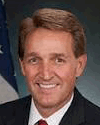
Jeff Flake (R) |

(D) |
The Democrats see this as one of their best pickup opportunities. Flake is one of the least popular Senators in Washington, with a miserable 39% approval rating. He barely won his first Senate race, failing to clear 50% of the vote, and he's up against the fact that Arizona is trending purple. He will face a challenge from the right—tea partier Kelli Ward, who gave John McCain a few headaches in 2016, is back for another go-round. Then, he'll have six weeks to pivot and deal with a challenger from the left. This will force Flake to hold Donald Trump close, and then to quickly put him at arm's length. The good news for the Senator is that the blue team's preferred candidate, Kyrsten Sinema, declined to run. There's still time for the Democrats to come up with a serious challenger, possibly 2016 Senate candidate Ann Kirkpatrick or maybe Mark Kelly, astronaut and husband of former representative Gabby Giffords. For now, however, all they have is attorney and activist Deedra Abboud. If they don't do better, Flake's seat is safe. |
Mississippi
| Incumbent | Challenger | Notes Polls |
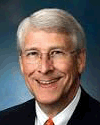
Roger Wicker (R) |

(D) |
There was a time when Democrats could win elections in Mississippi by just showing up, but then the Civil Rights Movement happened. The last time the state sent a Democrat to the Senate was in 1982, when John C. Stennis was elected to the final term of a career that began in 1947. Roger Wicker is going to get his third full term in a walk; no Democrat has even hinted at challenging him, and it's possible none will bother. |
Nebraska
| Incumbent | Challenger | Notes Polls |
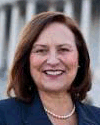
Deb Fischer (R) |

(D) |
Fischer has moderate approval ratings (54%), and is having moderate success at fundraising ($2.4 million). However, her real Achilles' heel is healthcare—Nebraska would be among the states hurt most by the AHCA, and Fischer has already faced more than one angry town hall crowd. Depending on how things unfold on that front, a seat that is currently safe for the GOP could be put in play. However, that would also require finding a viable challenger, and the Democratic bench is paper-thin. The only member of the blue team currently holding office at the state or federal level is Crystal Rhoades, who is Public Service Commissioner for District 2. Not exactly a springboard for those who aspire to higher office, generally speaking. Maybe the Democrats can dig up William Jennings Bryan and run him. |
Nevada 
| Incumbent | Challenger | Notes Polls |
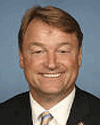
Dean Heller (R) |

(D) |
Heller is the most endangered Republican senator in 2018, first and foremost because he's the only one from a state won by Hillary Clinton, but also because he's aggravated Latino voters with his support for Donald Trump and also women voters with his votes to defund Planned Parenthood. The Democrats have yet to settle on a candidate, though Majority Leader of the Nevada Senate Aaron Ford; Reps. Ruben Kihuen, Jacky Rosen, and Dina Titus; and Clark County District Attorney Steve Wolfson have all been mentioned. Whoever it is will get major support from the DSCC. There's also a chance that Heller will face a primary challenge from term-limited governor Brian Sandoval. If that happens, it would be bad news for the Senator, but would also be bad news for the Democrats, since the state's first Latino governor is very popular. |
Tennessee
| Incumbent | Challenger | Notes Polls |
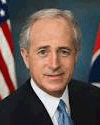
Bob Corker (R) |

(D) |
At the moment, there's nothing to see here. Tennessee is a very red state, and the voters are happy with the job Corker is doing. The only wild card is that the Senator is toying with a run for governor; if he pulls the trigger, that will throw the race into question. Unfortunately for the Democrats, the question will be: "What Republican will take Bob Corker's place in the Senate?" This one's about as safe as it gets for the GOP. |
Texas
| Incumbent | Challenger | Notes Polls |
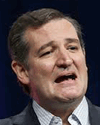
Ted Cruz (R) |

(D) |
There's no doubt that Cruz is a solid favorite to win election to the Senate for a second time. He has huge name recognition, a solid base of support, and has outraised all of his colleagues besides Elizabeth Warren, with receipts of $11.7 million. That said, his approval rating is only middling (52%), and many Texans are none too thrilled that he's using them as a stepping stone to bigger and better things, and/or that he's flip-flopped so dramatically on Donald Trump. Plus, if there's one guy the RSCC won't go out of its way to help, it's Ted Cruz, who is pretty much universally loathed by his colleagues. He's already drawn at least one serious Democratic challenger in Rep. Beto O'Rourke, whose Catholicism, down-to-earth manner, and ability to speak Spanish fluently play well in the Lone Star State. There's also the possibility of a primary challenge, possibly from George P. Bush (son of Jeb) or Rep. Michael McCaul. In short, this one's not a serious race yet, but it has the potential to become one. |
Utah
| Incumbent | Challenger | Notes Polls |
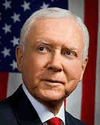
Orrin Hatch (R) |

(D) |
Thus far, Orrin Hatch—who will be 84 on Election Day—is the only sitting Senator to openly consider retiring. Until he decides, this one's in a holding pattern. Nonetheless, the GOP will have no shortage of candidates. Mitt Romney and Rep. Jason Chaffetz are already out, though there are some hints they may change their minds. There's also Jon Huntsman, Rep. Mia Love, Evan McMullin, and Mitt's son Josh. Whatever happens, it will be a Republican that heads to Washington in 2019; the Beehive State hasn't elected a Democratic Senator since 1970, and there's no plausible chain of events that could change that in 2018. |
Wyoming
| Incumbent | Challenger | Notes Polls |
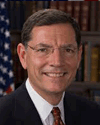
John Barrasso (R) |

(D) |
And finally, it's the biggest slam dunk of them all for the Republicans. Barrasso's 73% approval rating trails only Bernie Sanders and Sen. Susan Collins (R-ME). Wyoming is ruby red, and the last three Senate elections have been decided by 55, 54, and 47 points, respectively. Barrasso could beat up a reporter the night before the election, and then get caught in bed with a live boy and a dead girl, and he'd still win. The Democrats don't have a candidate yet, and are still trying to figure out if any members of the Party actually live in Wyoming. |
Email a link to a friend or share:
---The Votemaster and Zenger
Jun01 Trump Likely to Exit Paris Accord Today
Jun01 Trump Is Running a Bake-off for Chief of Staff
Jun01 Trump Is Having Trouble Hiring Senior Officials
Jun01 Trump's Approval Ratings Continue to Erode
Jun01 Why Russiagate Is Not Watergate
Jun01 Republicans Are Already Gunning for Elizabeth Warren
Jun01 CNN Cans Kathy Griffin
Jun01 More Senate Races
May31 Trump's Communications Director Leaves
May31 Trump's Communications Strategy Really Is a Mess
May31 Can Trump Stop the Leaks?
May31 Russians Discussed "Derogatory" Information about Trump and His Aides
May31 Dirty-Money Case Could Ensnare Trump
May31 Rundown of the Senate Races, Part I
May30 New Main Page Today
May30 Trump Is Consumed by the "Russia Thing"
May30 Trump Should Fire Kushner
May30 Trump Can't Decide How to Deal with the News
May30 Trump Staffer Says that the Portland Attacks are Unacceptable
May30 Can the President Be Indicted?
May30 The CBO Score and Election Year Pain
May30 The Sanders Revolution is Fizzling
May30 Georgia Republican Is Running with Trump and against Trump at the Same Time
May30 Wisconsin Democrats Like Their Chances of Knocking Off Scott Walker
May29 Merkel: United States Is Not a Reliable Partner
May29 Trump Calls Kushner Reports "Fake News"
May29 Intel Pros See No Legitimate Explanation for Kushner Plan
May29 Rosen: Trump No Media Master
May29 Mattis: ISIS Policy Now "Annihilation"
May29 Trump Pressed to Speak Out on Portland Attack
May29 Trump's Budget Got a Chillier Reception than Bush's
May29 Who Is Trump Most Like?
May28 Trump: I Think We Hit a Home Run
May28 Trump Plans to Back Out of Paris Accord
May28 Florida Republican Worked with the Russians
May28 McMaster: I am Not Concerned about a Backchannel with Russia
May28 Follow the Money
May28 Is Trump Stuck?
May28 Bannon May Return to Prominence as "Wartime" Consigliere
May28 Tillerson Will Not Host Ramadan Reception
May25 Former CIA Director Tells House that Russia May Have Recruited Trump Campaign Aides
May25 Did Russia Buy Ads on Facebook during the Election?
May25 Trump Administration May Have Spilled the Beans Again
May25 Trump Tax Plan Contains $2 Trillion Error
May25 Does Trump Have Brain Disease?
May25 CBO Will Release Its Assessment of the AHCA This Afternoon
May25 The Midwest Shifted Sharply toward the Republicans in 2016
May25 At Fox News, No Matter How Much Things Change, They Stay the Same
May25 Texas Adopts New Voter ID Bill

